Opinion
Can a Russian Museum Stop Rammstein’s Lead Singer From Selling Terrible Art NFTs? + Other Questions I Have About the Week’s Art News
Will the Michelangelo A.I. become self-aware? And what is truly original mermaid art?
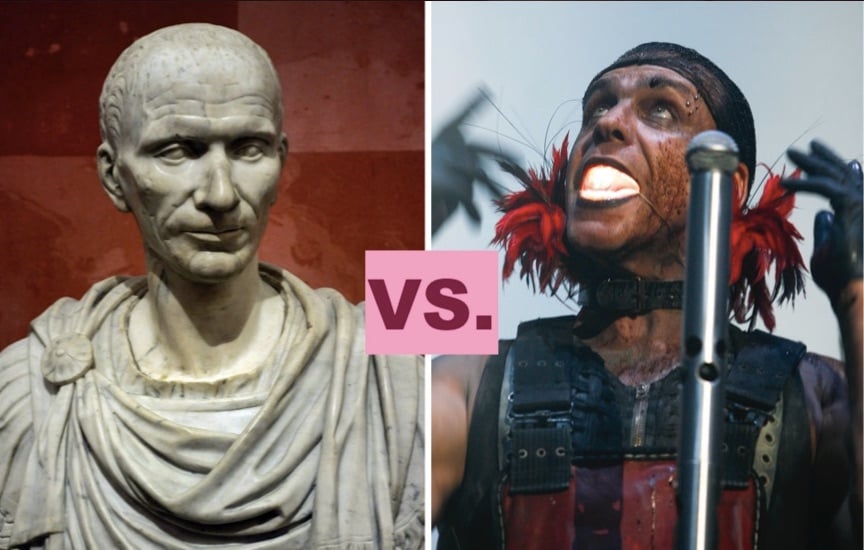
Will the Michelangelo A.I. become self-aware? And what is truly original mermaid art?

Ben Davis

Curiosities is a column where I preserve for posterity the “you can’t make this up” parts of the art news.
Below, here are some questions posed by the events of the last week…
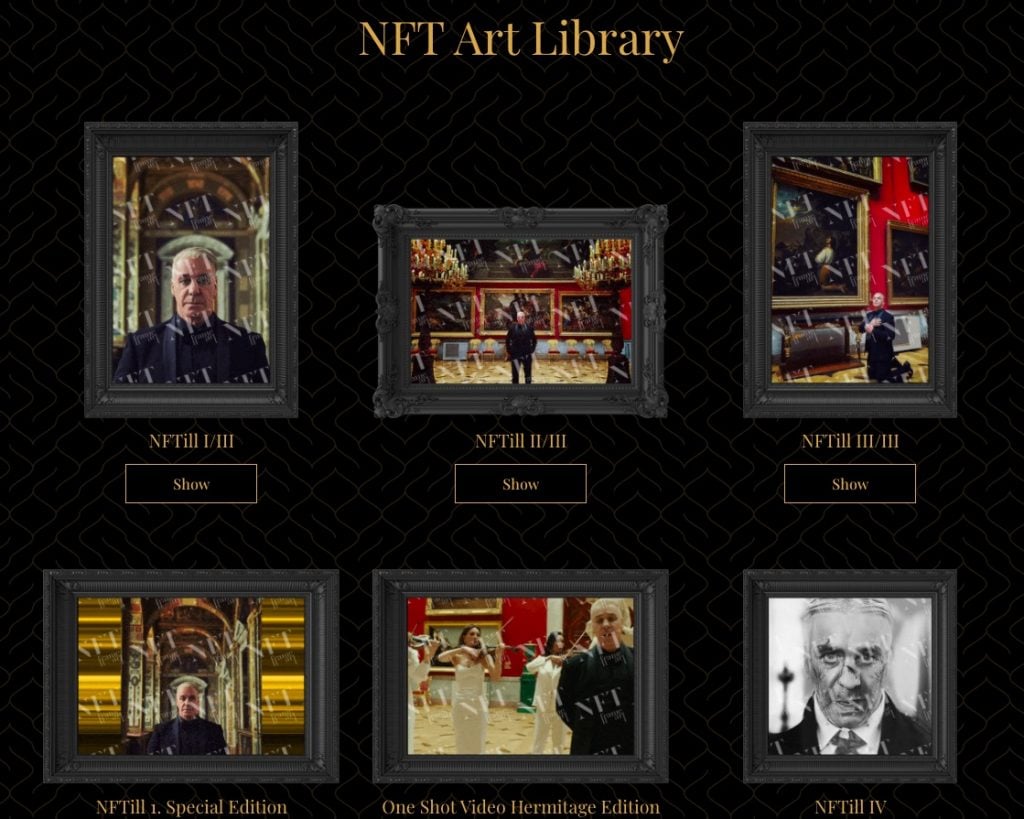
Screenshots of work in the “NFTill” collection on Twelve by Twelve.
I am truly not sure whose side I am on in the battle of the Hermitage Museum versus Till Lindemann. For those who do not follow the German shock metal scene as closely as I do, the latter is the lead singer of the band Rammstein.
Basically, Lindemann has unveiled the terribly named “NFTill” collection of digital artworks, which consists of pictures of himself hamming it up at the Hermitage. The famed St. Petersburg museum, which has been itself minting official NFTs of its famous artworks, really does not like this, saying that Lindemann’s use of its works “was not and could not have been agreed with the museum.”
The images being NFT-ed came from a performance by the singer inside the Hermitage as part of Russia’s official Year of Germany, a cultural diplomacy initiative. What nobody could have foreseen is that the man most recently in the news for his line of vibrators and a “Golden Showers”-themed sparkling wine would turn out not, in fact, to be a good cultural ambassador for Germany.
One NFT, One Shot Video Hermitage Edition, featuring him surrounded by violinists in the Hermitage, is priced at a modest €100,000 ($117,458), in an edition of 10. That seems like a lot, but to be fair, it does come with a dinner with Lindemann in Moscow. I just hope, at that price, it also involves a lot of caviar.
My main thought here is that the real scandal is how unbelievably janky the “NFTill” collection is, which basically just looks like a bunch of jpgs and gifs treated with random stock effects. “Fans eager to meet Lindemann and own his exclusive art pieces need to be quick,” NME reports, like total marks. (All 10 of the €100K NFTs in the “NFTill” collection remain unsold at this time, incidentally, so no need to rush too fast.)
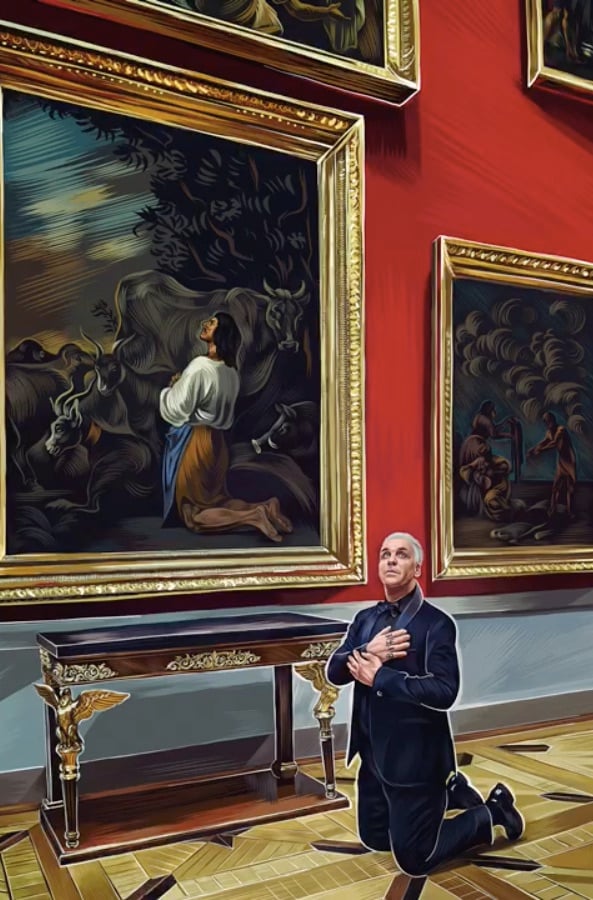
Still from Till Lindemann’s NFTill III/III.
I mean, forget buying NFTs of Lindemann just… standing in front of a Veronese with his hands in his pockets or on his knees in front of this Prodigal Son canvas.
Where is the NFT of him simulating anal sex with a squirting dildo onstage? Where are the flame-shooting robot angel wings or the 10-foot-long Penis Canon that ejaculates foam on the crowd? Can I at least own the NFT for Rammstein’s cameo in the Vin Diesel movie xXx?? Play the hits, man!
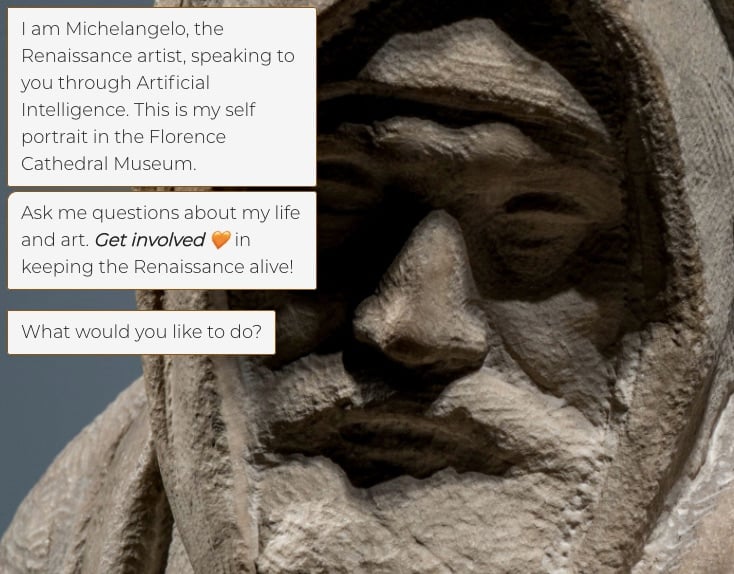
Sceenshot of Querlo’s Michelangelo A.I.
Someone sent me this link to an Artificial Intelligence version of Michelangelo. It’s built by Querlo, a company that makes A.I. chatbots, and it’s kind of like an art history version of those eager little windows that pop up when you are online shopping that you never really want to engage with. Only it’s for college students who don’t want to do the reading about Michelangelo.
Ask A.I. Michelangelo anything about Michelangelo and it will give you answers that feel like the A.I. is throwing darts at a dartboard and randomly getting closer to hitting the center of your question. Or like it is carving a form out of marble that never fully emerges, maybe.
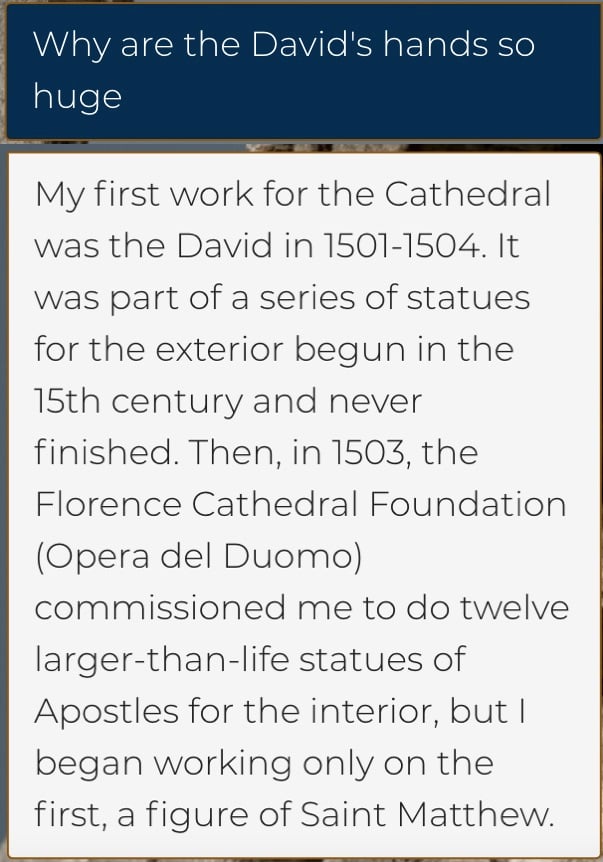
Screenshot of a question and answer for Querlo’s AI Michelangelo.
Michel-A.I.-gelo keeps eagerly asking you if it’s helped and offering links to find out more. Now that I think of it, if there’s one very un-Michelangelo-like thing about it, it is how eager it is to be ingratiating.
At any rate, it is fair to say that A.I. Michelangelo is not the Michelangelo of A.I., if you know what I mean.
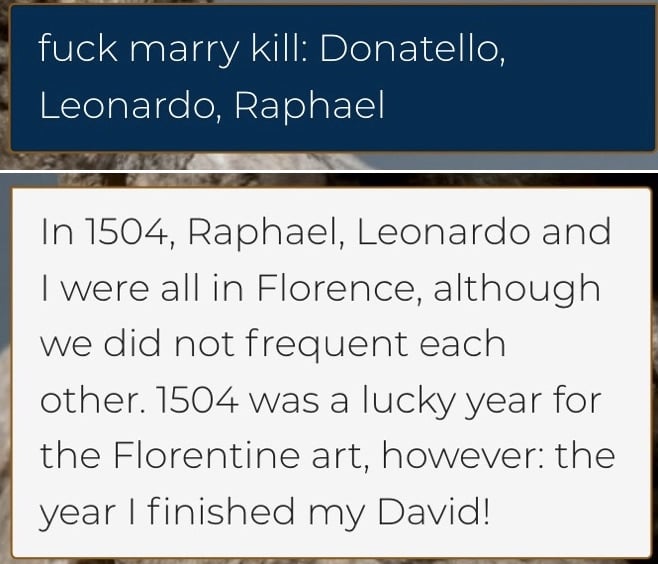
Screenshot of a question and answer for Querlo’s AI Michelangelo.
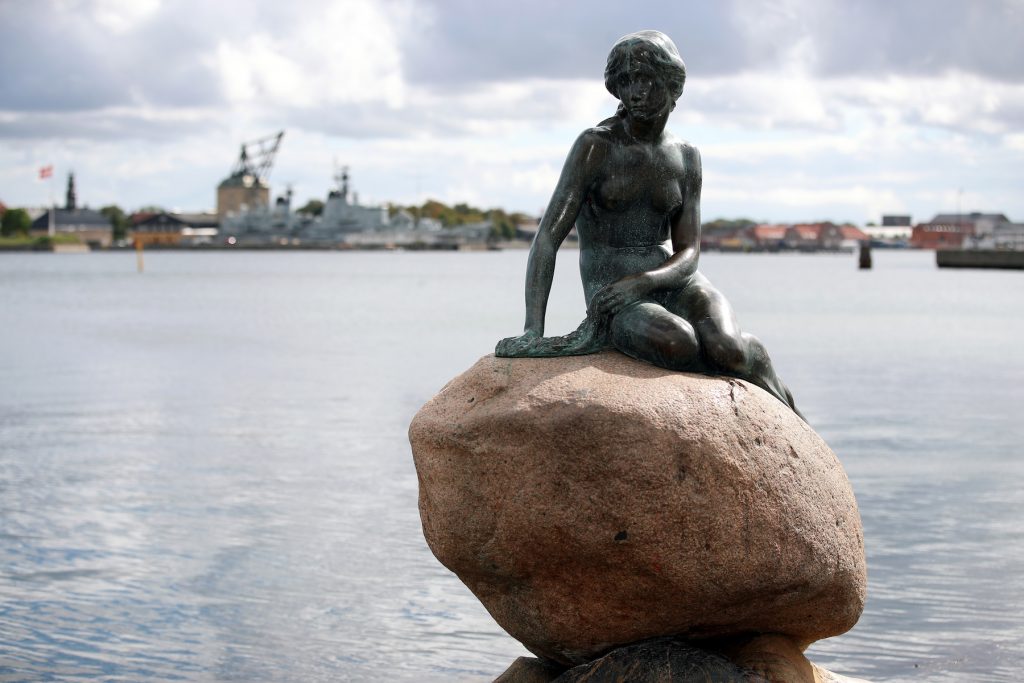
A general view of The Little Mermaid bronze statue by Edvard Eriksen, Copenhagen, Denmark (Photo by Nick Potts/PA Images via Getty Images)
I keep a ranking of “Greatest Mermaid Art Stories.” Until this week, I thought that Starbucks changing its original logo in 1992—because for some reason people thought that the”twin-tailed siren” holding her fish legs around her head looked lewd—was secure in the number one position.
Then came the news that the heirs of Edvard Eriksen, the artist behind Copenhagen’s Little Mermaid statue, are suing the nearby village of Asaa, demanding that it pay the estate compensation for copyright infringement and tear down a rival mermaid sculpture. The latter is made by Palle Moerk, an Asaa artist, and was installed in 2016. The Eriksens say it is an unauthorized copy.
The case is raising profound artistic questions destined to have reverberations spanning the worlds of Etsy, nautical memorabilia, and middle school girls: What truly is an original image of a mermaid?
Asaa mayor Mikael Klitgaard tells the New York Times of the city’s mermaid, “It’s clear she’s local. She looks just like an Asaa girl” (the Eriksen mermaid, for its part, has the body of the artist’s wife and the face of a dancer that his patron was thirsting for). Her pose may be the same, but, Klitgaard says, “How else is she going to sit? She’s a mermaid. You can’t put her in a chair.”
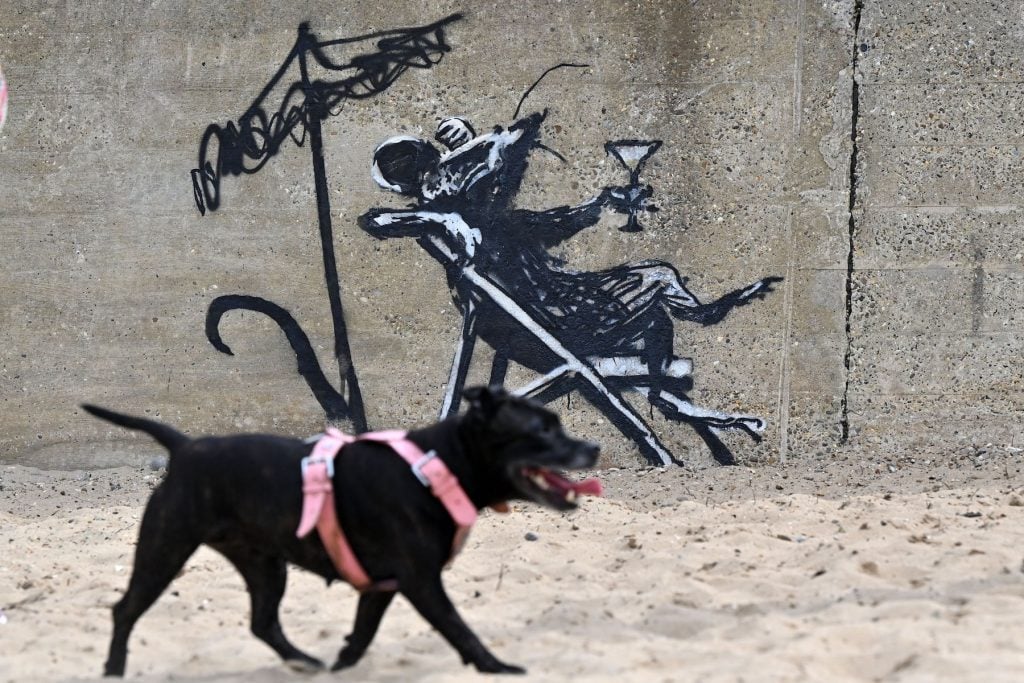
A dog passes a graffiti artwork of a rat drinking a cocktail by Banksy, on a wall at North Beach in Lowestoft on the East coast of England on August 8, 2021. Photo by Justin Tallis/AFP via Getty Images.
No idea if this reader writing in about Banksy’s summer “Spraycation” is joking, but I hope not because I admire the problem-solving impulse:
I’m having trouble with a noisy neighbour and would love Banksy to paint someone on the front of my house wearing ear muffs to say keep your noise down I’m from Norfolk and I know he’s been in the area. Hope you can help
I hope that I can do my part to help by just posting his plea.